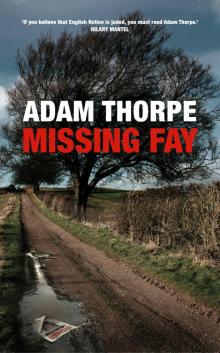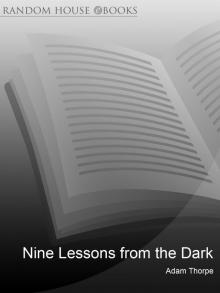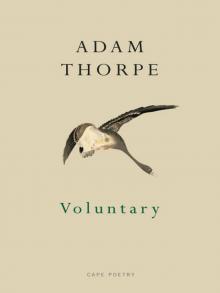- Home
- Adam Thorpe
Between Each Breath Page 12
Between Each Breath Read online
Page 12
One day you are in a trying time, the next you are in a tragic time. And the trying time seems like a lovely, innocent time compared to the sad, unimaginable time of now.
They were going out for dinner with the Nicholsons, who were old Oxford chums of Milly’s. He was a wealthy and successful barrister, she was a curator at the V & A. They were chiefly notable for never asking a single question about Jack’s work. They lived in Maida Vale, at the furthest end of it, which was awkward to get to by car. It wasn’t really that awkward, but Jack disliked going to dinner with the Nicholsons. It was not that he wanted them to ask questions about his work, because those would be bound to be dull or even stupid questions, but he would have quite liked some sort of recognition that he existed as a professional entity. They made him feel he was a social parasite, that Milly’s marriage had been disappointing, merely a reflection of her leftish political views. They said nothing overtly, of course, but it was all suggested in the silences, in what was omitted. They impressed and frightened Jack, although he was slightly older than them. The Nicholsons had three small children, who were unfortunately very sweet and gifted in all sorts of directions. He was called Oscar, for some reason, and she was called Olive. Oscar and Olive. They had a Bolivian nanny called Heaven.
Milly and Jack were late. Milly had had a scan that morning in which she imagined she’d seen the eyelids among the fish-like flashes and shadows, and had spent most of the afternoon running up curtains for the nursery with builders tramping in and out and playing their radio too loud. She was tired carrying her unborn baby about, and would have liked to have gone to bed with a book. But the Nicholsons knew the Prime Minister and were not the type you cancelled dinner with. Oscar Nicholson was an expert on wines, more expert even than Daddy. He was mad about wines from South Africa.
On the way there, Jack was very grumpy. He said he wasn’t going to drink apartheid wine tasting like the kerosene that brought it over and listen to Oscar and Olive go on about their fucking great mansion in the French countryside. Milly tucked her thumb under the seat belt and eased it away from her enormous tummy and told him not to be silly, apartheid ended years ago and that he only had to put up with the Nicholsons once or twice a year.
‘Time scurries along,’ said Jack. It was the first year – popularly, though not technically – of the twenty-first century, which already felt tarnished.
‘Your favourite phrase.’
‘Yup, I recycle them. I’m ecological.’
‘Please slow down. You’re making me feel sick.’
Jack was sure, afterwards, that he had actually slowed down before it happened. He was certainly pretty much within the speed limit, which was thirty coming into Maida Vale. The long, straight road was joined by another minor one to his left on which a four-by-four appeared and he clocked it as slowing down but then, quite astonishingly, its massive five-barred gate of a snout was right in front of him and he pulled hard down on the wheel and swerved, hitting the kerb of a traffic island with a jolt and then braking to a stop several yards further on. Their little VW must have missed being splodged by the four-by-four by half an inch.
‘Fucking hell,’ he said. ‘It didn’t stop. Are you all right?’
Milly was short of breath. She was holding her stomach.
‘The seat belt,’ she said. ‘I was sort of squashed against it.’
‘Oh Jesus,’ said Jack, who had a tendency to panic.
‘Baby’s fine,’ said Milly, who had a tendency to show pluck. ‘It kicked in protest.’
‘Could have been a lot worse,’ said Jack. ‘Complete berk driving one of those bloody great evil Amanda tractors.’
The other vehicle had stopped. Jack got out and went over to it, red with rage. An elderly woman was peering down at him through the driver’s window. She reminded Jack, with her straggly, dyed blonde hair, of a famous photograph of a stricken refugee off to the death camps in a train. She opened the door and it swung right out with its own weight. Jack glared at her.
‘Were you trying to kill us, or something?’
The woman was very smartly dressed, with gold bangles on her wrists.
‘I looked, and I saw nothing,’ she said, in an accent that might have been Dutch. ‘You were arriving like a mad man.’
Jack opened his mouth in astonishment. The woman smiled at him wanly. Milly was calling him. He held the four-by-four’s heavy door in his hand and, after a little effort as the vehicle was on a slight incline and the hinge seemed to be stiff, slammed it with great force and ran back to his car.
‘Whassup?’
‘Nothing,’ Milly said. ‘We’re very late, that’s all.’
Milly looked chalk white, but that was the street lamp on the traffic island. Jack had never liked Maida Vale with its straight roads and its enormous Victorian houses: it struck him as sterile, despite the leafiness. They got to the Nicholsons’ three-quarters of an hour late. Olive said it was just as well, she’d had time to read to the children herself and now Heaven was telling them a folk story in Spanish, which they adored because they understood it. Oscar looked disgruntled under his bonhomie.
‘How’s the walking cradle?’ he boomed.
‘I’m just great,’ Jack joked, before Milly could reply. He liked to play up the working-class-boy-made-good in front of the Nicholsons, even though he never felt working class. It disarmed their own more subtle attempts to do it for him. ‘I’m rocking on fine, man.’
‘Scan this morning,’ said Milly. ‘Heard the heartbeat. Saw the eyelids.’
‘Is it a boy … or a girl?’ asked Oscar, frowning at them as he must do in court when cross-examining a witness.
‘Maybe they don’t want to know!’ laughed Olive, coming up along the hallway behind and putting her hands on Oscar’s back.
‘Exactly,’ said Milly.
‘Come through, you guys,’ said Olive, kissing them on the cheeks in the French way. ‘Meet the neighbours.’
The neighbours turned out to be a young Indian couple from Boston who were ‘frighteningly brilliant’ research chemists in something called biotronics. As ever at these occasions, half an hour of mutually intense, very interesting information was shared between complete strangers before familiarity crept in and the defences went up. The Indian woman, called Moona, was remarkably thin and beautiful, with breasts like a pair of eggs jutting beneath her silk blouse; Jack imagined hugging her and breaking them. There was already an immediate kerfuffle over the pre-prandial stage, since Olive was keen for everyone to go straight into the dining room to eat, while Oscar wanted the new arrivals to sample his 1964 South African sherry. Unusual nibbles in majolica bowls lay strategically distributed around the sitting room like a reproach: it looked as if no one had touched them.
‘Told you, still apartheid,’ Jack murmured to Milly, as they passed into the dining room.
They sampled the sherry at the vast oak table while Olive was perfecting the opening vichyssoise in the kitchen: it had a special sauce that required some last-minute operation with a lemon. The conversation drifted into politics over the main course, a superb duck à la provençale ‘with herbs from our garden near Les Baux’. The two hosts looked horribly tanned in the candlelight, which exaggerated Milly’s pallor, as did Moona next to her. Oscar and Olive were very much against letting in lots of refugees, as they thought it was bad for the refugees. A group of Kosovars had been housed in a community hall in Maida Vale.
‘They were really depressed,’ said Olive. ‘I took them some spare toys for the little ones and, honestly, I felt like Mary Poppins. They all hugged and kissed me. Hell of an uplift but they were rather smelly.’
‘Dignity’s the first to go,’ said Oscar.
‘I hope you had a good scrub down afterwards, Olive,’ said Jack.
Jack and Milly had been against the bombing of Serbia, although they recognised that Milosevic was awful; Moona and her husband declared themselves neutral, which annoyed Jack even more. Jack had written a protest piece
in 1998 called No Arms, No Legs, which drew on Janáek’s nursery rhyme sequence, ikadla, and featured a mezzo-soprano, a clarinet, a piano, and three mimes. The mimes were not very good. It received a standing ovation at Dartington, a sympathetic review in the Guardian, and then disappeared. He described this piece self-deprecatingly but at some length, mainly for the other guests’ benefit, until Oscar broke in, wondering if Milly was all right. Milly’s forehead was glimmering with sweat and she looked deathly, but she dazzled them all with her smile and said that she’d overdone it and was just a little tired.
There was an awkward silence and Jack felt foolish. Then Oscar served some more Haut-Médoc from outside Johannesburg and Olive started on about Cherie Blair and how well Cherie coped with being a mother, despite being a high-flying lawyer. Beyond her head Jack noticed an old-master painting of a cow standing in a stream with Wenzel Hollar on the label. Olive insisted that Tony Blair was a marvellous father and husband and a very fine and very brilliant politician who wasn’t afraid of having ideals.
‘He’s actually a terribly nice chap,’ said Oscar, in case they hadn’t got the point.
‘You know him personally, Oscar?’ Moona asked – which was precisely the point, in fact.
‘The man of teeth,’Jack interleaved, but no one noticed.
‘Oh yes,’ said Oscar, modestly; ‘have done ever since Islington.’
‘What happened in Islington?’ asked Moona’s husband, his heavy, existentialist’s spectacles flashing the candlelight.
‘Oh, we lived there,’ said Oscar. ‘We were virtually neighbours. Borrowed tea, that sort of thing.’
Moona frowned. ‘Borrowed tea? You mean you gave it back afterwards?’
‘Coffee, tools, that sort of thing,’ Oscar went on, ignoring her joke. ‘A piece of three-ply chipboard once, God knows what for.’
‘I’ve always found our Tony rather camp,’ tried Jack again – which was in fact an observation stolen from Howard, who was deliberately camp.
‘Camp?’
There was an awkward silence, during which Jack realised how camp Oscar must look in his wig and robes.
‘Don’t see it myself,’ said Olive.
‘There’d be nothing wrong with it if he was, of course,’ Jack mumbled. ‘On the other hand,’ he said, reviving his fortunes under the influence of the thick-tasting, over-powered Haut-Médoc, ‘there would be something wrong if he believes he has a direct line to Our Lord, as is rumoured. Most of the rest of us have to go through to the operator.’ No one laughed. He floundered on. ‘Olive, now, does the present Prime Minister believe he has a private direct line to our Lord?’
Olive blinked. ‘That is one slight drawback, yes,’ she said.
‘In what way? Detail, detail.’
‘Well, he does listen to God every evening, on his knees.’
‘Thought so,’ said Jack. ‘That must be very reassuring for him, knowing that he can never make the wrong decision.’
‘I suspect most leaders think they have God on their side,’ said Moona’s husband, sounding very grown-up and sensible. ‘Most Americans do. We underestimate religion, believing everybody’s basically rational. This George W. Bush, son of ex-President Bush, he’s about to be the Republican candidate, you know?’
‘Vaguely,’ said Jack.
‘Now he’s got the Christian Right behind him,’ Moona’s husband went on. ‘Wait till he gets to be President. Then the shit’s gonna hit the fan,’ he added, to Jack’s relief.
Olive pulled a face, more at the expression than at the prospect of someone she had hardly heard of becoming President of America.
‘Wicked,’ said Jack, lifting his glass to his nose. ‘Can’t wait.’
‘I think I’d better go and lie on the sofa,’ said Milly, in a faint voice. ‘I’m incredibly sorry.’
‘Sorry, Mill,’ said Oscar. ‘What’s up?’
‘Sorry, we’ve been ignoring you, darling,’ said Olive, cocking her head to one side, having clearly not heard precisely what Milly had said.
There was a pause and then a subtle ripple of panic passed over the table. Everyone except Moona’s husband stood up in a chorus of apologies – perhaps in order to ward off the awful thought that something serious might be happening. Jack led Milly to the sitting room with Oscar and Olive fluttering at her side. Moona had poured out a chilled glass of water from the jug and soaked a napkin in it. Her husband stayed put, telling Moona he was better out of the way, and carried on eating. The napkin was applied to Milly’s forehead.
‘Oh, I’m really, really sorry,’ said Milly, ‘but I think I’m bleeding.’
Jack was feeling physically sick with panic.
‘Oscar, where’s the bloody phone?’
‘Hold on, hold on. There’s no point in getting in a state.’
‘I’m not in a fucking state! I just want to call a doctor, urgent.’
‘I can’t feel my baby. I think it’s all gone wrong.’ Milly was running her hands over her belly. There were spots of liquid on the massive, comfortable sofa, which Olive had covered in a hand-woven tapestry. Pointlessly large, fat tassels hung inside at each corner and were getting in the way. ‘I can’t feel him move.’ The liquid wasn’t blood, however, though it wasn’t quite clear either.
‘But it doesn’t move all the time,’ Jack cried. He had never seen Milly in such a state. It was awful. She was almost annoying him. And why had she said ‘him’ when they didn’t know? Moona was stroking her forehead and Olive had gone off to get towels. Oscar was talking to the medical services on the phone, giving them directions in his deep, careful, barrister’s voice. Now Milly was crying. Jack felt his insides turning turtle. The more stressed she got, the worse for the baby.
‘Do you think a brandy’s out of order?’ said Oscar, putting the phone down.
‘It was that bloody four-by-four,’ said Jack. ‘The stupid woman came straight out in front of us and Mill got a bit of a shock.’
‘Seat-belt pressure?’ said Olive.
‘Yes,’ said Jack. ‘Why? Is it known about?’
‘It’ll be fine,’ said Olive, but Jack saw something else in her eyes.
When the doctor came, fifteen stretched-out minutes later, Milly had calmed down. Her face was like lightly stained marble, with red patches under the eyes. The towel was not very wet and not at all bloody, Jack was relieved to see, though there were reddish streaks. All they needed, surely, was something to bung her up with. The main discussion during the fifteen minutes had been whether to take her straight to Casualty themselves. Oscar wasn’t quite sure of the quickest way to the nearest hospital, and was trying to find an A–Z. It was probably in his chambers, he told them. When the doorbell had finally rasped (there was something wrong with it, it was an original feature), they all let out a sigh of gladness. The doctor was a small, stout woman in her fifties who looked fed up at being called out on a Saturday night, but she immediately buzzed for an ambulance when she heard about the seat-belt business.
‘Why didn’t you call an ambulance straight away?’
‘No one thought of it,’ said Oscar.
‘No,’ sighed the doctor, as if they’d all failed the primary test.
‘I did wonder about that,’ said Moona’s husband, who had finally come through.
Jack was sitting on the floor, holding Milly’s hand. He felt as if he’d clambered up through thick fog onto a vast and calming plain. Things were under control. The details of the sofa’s tapestry, the overdone tassels, the wet hairs on Milly’s forehead, the needlepoint cushion behind her head, seemed to him heroic in some way. The two of them were at the centre of everything, the centre of the world and of time and of space. He wasn’t sure about the third, about the invisible baby.
The scan showed a blank screen. A black screen, blacker than a blank television. There were none of those little white fishy flashes, no shadows of limbs and head, no precious movement and no heartbeat.
‘There’s no heartbeat, I’m afraid,’ s
aid the woman in her white coat, a biro stain at the base of its top pocket.
The screen was so incredibly black, like outer space. It didn’t even yield the dead baby. Jack felt like hitting the top of the screen, as his father would do for him during Top of the Pops when the TV went phut, even though his father hated Top of the Pops. Max, they were going to call him. Or Pippa, if it had been a girl. The nurse told them to go back home until Thursday because they only did emergency deliveries. Jack tried to get angry with her but was too busy hugging Milly, who was sobbing on a plastic bucket chair in the corridor. They called for a taxi to take them to the Hospital of St John and St Elizabeth, the reassuringly private clinic overlooking Lord’s cricket ground, but even there they told them to come back the next day. He wasn’t sure how they survived the interim. Milly lay on their bed and, although he was holding her, said she had never felt more alone. Jack knew why this was: she had been carrying another being, and now she was not.
The ever-sleeping baby was delivered, perfect in form, with the help of a lot of drugs, in an ordinary little hospital room – but still Milly had screamed in pain as she would have done if the baby was alive. Jack had not expected that. He felt distant, as if watching from a great height. The midwife was saintly and strong, as if created in some other realm expressly for this kind of pain and solace. It was a boy.
‘Max,’ said Milly, fifty years older and trembling. ‘Oh, Max. My Max.’
Max was cleaned up and wrapped in a towel and they held him in turn through almost two hours. He smelt of baby lotion and powder and raw fish. His eyelids were slightly open and a slit of white was visible, as in a marble sculpture. The tiny fingers didn’t grip, and they had perfect little nails. Jack felt closer to Milly than ever before, but at the same time she was locked away in her own grief, something calm and white and level he could not touch.

 Missing Fay
Missing Fay Hodd
Hodd Pieces of Light
Pieces of Light The Standing Pool
The Standing Pool Ulverton
Ulverton Nine Lessons From the Dark
Nine Lessons From the Dark Flight
Flight The Rules of Perspective
The Rules of Perspective From the Neanderthal
From the Neanderthal Is This the Way You Said?
Is This the Way You Said? Still
Still No Telling
No Telling Voluntary
Voluntary Between Each Breath
Between Each Breath